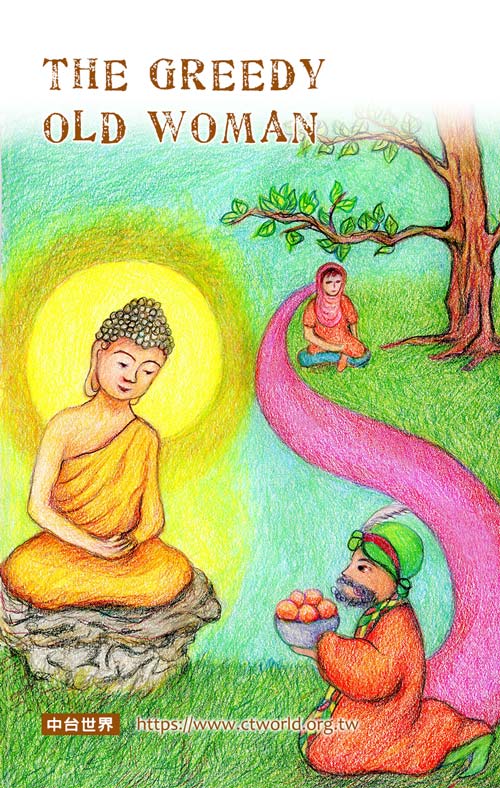
When the Buddha was in Anathapindada Park at Jetavana Grove in Shravasti, there was an old maid named Shan Ai in King Prasenajit’s palace. She was miserly and selfish, caring for no one but herself.
To help Shan Ai change her ways, the Venerable Maudgalyayana took up his alms bowl and used his supernatural powers to emerge from the ground before her. Seeing a monk come to beg for alms, the old woman became irritated, refusing to give Maudgalyayana even a single bite of food. She leisurely finished eating and all that remained were a few bits of fruit and some dish water.
Even so, Maudgalyayana begged for those leftovers, which the old woman begrudgingly gave. Having received an offering, the monk flew into the air and displayed eighteen transformations to help Shan Ai bring forth reverence for the Way and cultivate roots of virtue. The old woman knew that she had encountered a saint. Filled with respect and shame, she wholeheartedly repented her ways. That night she died to be reborn in a wilderness, where lived under a tree and survived on wild fruits and forest water.
One day, King Prasenajit and his courtiers were hunting in the wilderness. They happened upon a person sitting under a tree. With hopes of obtaining water to quench their thirst, they approached the stranger; but as soon as they neared, a circle of flames surrounded the tree. Through the flames, the king asked, “Who are you? What are you doing here?”
The stranger relied, “I was once an old maid named Shan Ai in King Prasenajit’s palace. Because I was selfish and greedy during my life, I was reborn here after I died. Please take pity on me, Great King, and make offerings to the Buddha and Sangha on my behalf to help me escape this suffering.”
The King replied, “If I make offerings for you, how will I know you have actually received merits from the deed?”
The person said, “One will undoubtedly receive merits from offerings to the Three Jewels—the King will surely see.”
King Prasenajit ordered his soldiers to stand within one hundred paces of each other and told them, “I will return to the city to make offerings on her behalf. If she receives merits as she says, you must inform me accordingly.”
Back in the city, the king immediately invited the Buddha and Sangha to attend a grand meal offering. Right after the Buddha had given his blessings, a feast appeared spontaneously before the woman under the tree.
The soldiers promptly relayed the news to King Prasenajit, who came to realize the inconceivable merits of charitable giving. Knowing that the King’s time had come, the Buddha gave a profound Dharma talk after which the King achieved srotapanna, the first fruit of arhatship.
REFLECTION
The Exposition of Karma Sutra defines ten merits gained from making meal offerings to the Three Jewels: 1. Longevity, 2. Wholesome appearance, 3. Bodily strength, 4. Strong memory, 5. Wisdom and eloquence, 6. Being a joy to behold, 7. Abundant wealth, 8. Intrinsic freedom in the human and heavenly realms, 9. Rebirth in the heavens, 10. Expediently attaining nirvana.
The king gave rise to deep faith in the Dharma and respect for the Buddha, so he was able to obtain the merits of a meal offering to the Three Jewels. He thereby realized the fruit of srotapanna, or stream enterer. However, Shan Ai was unable to transcend the mundane realms because of the greed afflicting her mind. Their story shows that making meal offerings is not only a way to counteract our greed, but also to plant the karmic seeds of liberation.